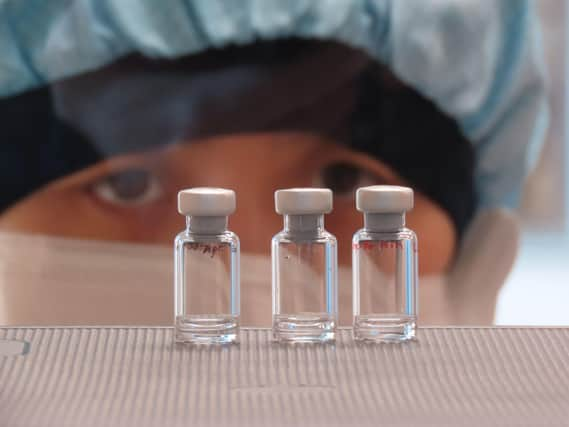Drug company claims virus vaccine ‘will be ready in September’


Pascal Soriot told The Andrew Marr Show yesterday that British people will get first access to the vaccine from autumn.
The pharmaceutical firm, which is working with Oxford University, had previously said it has secured the first agreements for at least 400 million doses of the vaccine.
Advertisement
Hide AdAdvertisement
Hide AdBut a leading member of the project told the Sunday Telegraph the lower transmission of Covid-19 in the community leaves the trial with only a 50 per cent chance of success.
Asked if people in Britain will be among the first to get the vaccine, Mr Soriot said: “Yes, we have actually received an order from the British Government to supply 100 million doses of vaccine, and those will go to the British people.
“And there’s no doubt, starting in September, we will start delivering these doses of vaccine to the British Government for vaccination.”
But Mr Soriot went on to say the possibility of the vaccine being rolled out in autumn depended on if an Oxford University trial worked before the transmission rate lowers further. He added: “The vaccine has to work and that’s one question, and the other question is, even if it works, we have to be able to demonstrate it.
“We have to run as fast as possible before the disease disappears so we can demonstrate that the vaccine is effective.”
Oxford University’s Jenner Institute and the Oxford Vaccine Group began development on a vaccine in January, using a virus taken from chimpanzees.
Following an initial phase of testing on 160 healthy volunteers between 18 and 55, the study is now set to progress to phases two and three, which involve increasing the testing to up to 10,260 people and expanding the age range of volunteers to include children and the elderly.
Professor Adrian Hill, director of the Jenner Institute, said if the virus’s spread is too low, not enough of the volunteers will catch it and the trial will be unable to definitively say if the vaccine works.
Advertisement
Hide AdAdvertisement
Hide Ad“It’s a race against the virus disappearing, and against time,” Professor Hill said. “We said earlier in the year that there was an 80 per cent chance of developing an effective vaccine by September. But at the moment, there’s a 50 per cent chance that we get no result at all. We’re in the bizarre position of wanting Covid to stay, at least for a little while.”
At the Downing Street daily briefing yesterday, Prime Minister Boris Johnson was asked by a member of the public how the UK Government was working with other countries to find solutions to coronavirus.
Mr Johnson said: “I do think one of the most depressing things about the way the epidemic tipped through the world was there was a kind of ‘devil takes the hindmost’ approach amongst so many countries that scrabbled to get their own share of very scarce resources such as personal protective equipment or enzymes for testing and a real fight took place across the world as we tried to protect our own populations.”
He said the Government wanted to see a “much more international approach” to produce long-term solutions and the UK would hold a summit on 4 June where nations would pledge “very, very considerable sums, we hope” into finding a vaccine.
He added: “Different people have different levels of optimism about whether we’ll get a vaccine this year or next year but I’m hearing more and more signs of confidence about our ability to do it and I certainly think we’ll do it all the faster if we collaborate across countries and across scientific communities.”
On Friday a scientist leading the development of the vaccine at Oxford University said it is “not possible to predict” when it will be ready.
But Professor Andrew Pollard, head of the Oxford Vaccine Group, said it was “very difficult” to know when scientists will have proof that it is effective.
He said: “It is a very difficult question to know exactly when we will have proof that the vaccine works because we need, within our population of 10,000 people, to have enough of those who have been exposed to the virus over that time, who are hopefully in the controlled group, who are getting the control vaccine, and to see whether the coronavirus vaccine protects them.
Advertisement
Hide AdAdvertisement
Hide Ad“Now there is uncertainty about how many cases there will be over the next three months. If there are cases then it is certainly possible by the autumn to have a result, and that is what we are hoping for, but it is not possible to predict.”
Comments
Want to join the conversation? Please or to comment on this article.